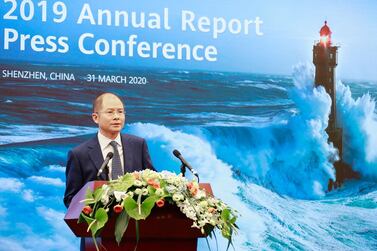Intel withdrew its full-year sales forecast, citing “significant economic uncertainty” caused by the Covid-19 pandemic.
The world’s largest semiconductor maker reported a 23 per cent jump in first-quarter revenue and better-than-projected profit, bolstered by demand for chips that run the laptops and server machines companies need to keep people working from home.
Though it gave an optimistic second-quarter sales target, Intel’s profit outlook fell short of estimates, sparking concerns that a spending slowdown will drag on business for the rest of 2020.
Sales in the current period will be about $18.5 billion (Dh67.89bn), the California-based company said in a statement. Analysts estimated $18.08bn on average, according to data compiled by Bloomberg. Net income will be about $1.04 a share, compared with Wall Street expectations of $1.11.
“Investors were caught off guard” by the profit forecast, Logan Purk, an analyst at Edward D Jones, said.
“When they are crushing it on the top line but whiffing pretty hard on the earnings, it’s a shock.”
Companies have reacted to coronavirus shelter-in-place orders by buying more laptops to keep employees working remotely. At the same time, data centre owners have responded to a surge in videoconferencing, social media use and movie streaming by stocking up on pricey Intel processors that run server machines.
Those trends fuelled a 14 per cent increase in PC-related chip sales in the first quarter and a 43 per cent gain in the company’s data centre division.
Still, the soaring first-quarter sales fed into concerns that demand may have peaked early in the year, with Intel and its customers girding for the worst recession since the 2008 financial crisis. The chipmaker said it expects weaker demand from government and corporate clients in the second half of 2020.
Revenue growth was strong in the quarter, but is “likely not sustainable,” said Morgan Stanley analyst Joseph Moore. While the factors behind a disappointing margin outlook were described as temporary, the company could face challenges in the second half of the year, he said.
“The second half demand picture is more uncertain,” chief executive Bob Swan said during a conference call with analysts.
For Intel’s PC chip business, the economic slowdown will outweigh demand from the work-from-home trend, the company said. The data centre division will benefit from continued chip purchases by large cloud providers, it added.
The company also sold $10bn of debt recently to give itself a financial cushion if needed, chief financial officer George Davis said in an interview following the results.
“At some point we are going to see the recession start to impact demand for PCs,” Mr Davis told analysts on the conference call. Intel is already seeing the impact on automotive customers and the Internet-of-Things business, he added.






